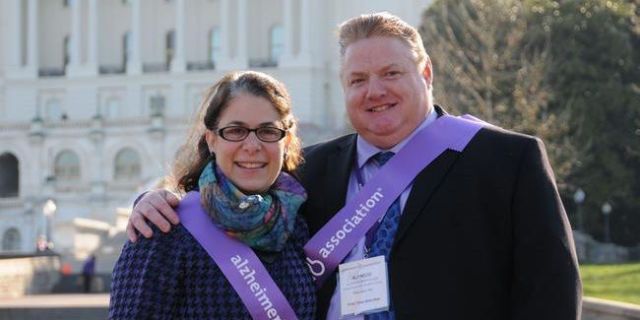Rhiana Kohl and Alfredo Bartolozzi of Watertown, Massachusetts, are the parents of two teenage daughters and have been married for 17 years. Three years ago, Alfredo, now 53, was diagnosed with Alzheimer's. Around that time, Rhiana, who is the main breadwinner in the family and works full-time at a corrections facility doing research and policy work, learned that Alfredo had mismanaged the couple's finances, borrowing $25,000 for a home repair that wrecked their credit and put them in financial jeopardy. Here's Rhiana's cautionary tale:
Five years ago, I started noticing changes in Alfredo's behavior. For example, he started getting lost in the car. One time, we were in two cars coming home from vacation when he turned off the highway. I thought he was stopping for coffee, but he told me he wasn't sure which road to take. That was the least of it.
Soon, his personality started changing. He got angry and agitated and would yell at our young daughters a lot. I knew something was wrong, but I wasn't sure what it was, so I sent him to anger management and adult ADHD classes. I had him see a doctor, but it didn't occur to me to go with him. For two years, Alfredo was misdiagnosed — his doctors thought he was just stressed, but nothing big had changed to cause it. All things considered, we had a good life.
We were always in good shape financially, as well. We had great credit and never lived beyond our means. Around the time I noticed Alfredo's behavioral changes, we needed to have some repairs done on the two-family home we own. I noticed that Alfredo's negotiations with the contractors weren't going smoothly, but I thought we had put together a good budget for the job. We ended up borrowing $25,000 and I didn't think to question anything because Alfredo always kept impeccable checkbook records. He could always tell me exactly how much money we had at any given point.
A year later, I went to use our credit card and it was declined. I went to the bank and found out there was nothing in our account. When I called Alfredo, he said, "I think we're tens of thousands of dollars in debt." I was in shock, but when I looked at our finances, I finally realized something was neurologically wrong with him.
There were checks that had never been cashed, and he had never paid any of the credit card bills. The interest on the loan had skyrocketed. I thought we were going to lose our house. I didn't know what to do. I loved him, but wondered if we should get divorced. We ended up separating for a short time.
Still, no matter how I felt about what Alfredo had done, I had to get him to the doctor. We saw the first one in December 2012. The next month, we were told Alfredo had dementia, but first they had to rule out Lyme disease and even copper poisoning. By February those were scratched off the list. Then, on the day he was supposed to have his neuropsychological test, the Boston Marathon bomber was in our town and everything was on lockdown.
I wanted to call a SWAT team to bring him to the hospital; I was that desperate to get him the test. But, of course, the hospital had been shut down, too. Alfredo finally had a lumbar puncture in May 2013. That's when the doctors gave us a definitive diagnosis.
Three years later, I'm stretched to the limit. My daughters are 13 and 16 and my parents are very elderly and frail. I call myself the "club sandwich generation." All I can do is come to terms with the fact that I can't do everything I think I'm capable of. Right now, I'm focused on doing as many family things as possible and maintaining as many of our rituals and traditions as long as we can.
Our financial life has totally changed. I wish I knew about Alfredo's disease sooner so I could have intervened. I'll never recover from the debt we've incurred, and we have so many extra expenses in terms of medical, travel, parking, and co-payments that things like family vacations have come to an end.
Even something as small as meals have changed. Though I try to have us sit down as a family as often as possible, I can't manage to cook. Because of that, we get takeout, upping the cost even more. Alfredo used to be our chef and our food shopper. He still was until about six months ago, but now he can't use the stove or grill. Even with signage and reminders, he forgets things, which worries me.
It's the little things people don't realize that make this disease so difficult to bear. That's why I decided to share our story.
♦
Carrying a price tag of $236 billion per year, Alzheimer's is the costliest disease both for families and for the nation as a whole, says Keith N. Fargo, PhD, director of scientific programs and outreach for the Alzheimer's Association. But most Americans are completely unaware of and unprepared for the financial burden that comes with an Alzheimer's diagnosis.
"The fact of the matter is that virtually no one can afford Alzheimer's," Dr. Fargo says. "Most people who are diagnosed are over the age of 65 and have already completed their retirement planning. Even people who have planned well for retirement are generally not prepared for the additional expenses that can come with a major chronic disease."
If you or a loved one is facing an Alzheimer's diagnosis, get in touch with the Alzheimer's Association right away. "We cover every inch of the United States with our care and support services," Fargo says. "We are here to help navigate what is a very distressing and difficult situation to be in." For more information and to help navigate the disease and how it will affect your finances, visit ALZ Facts & Figures and Planning for Care or call the association at 800-722-3900.













